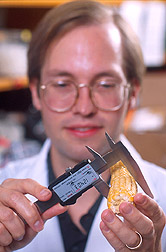Stories of Technology in Agriculture
 An Indiana Jones? Add a dash of Steve Jobs and a touch of detective and you come close to the skills and interests of ARS researcher Ed Buckler. “I have always loved archeology, biology, history, and computers. Surprisingly, working on the genetics and diversity of maize (yup, he means corn) is a great way to combine these interests into a truly rewarding career.” Arlington, Virginia, is a small, highly populated county across the Potomac River from the District of Columbia, not known for its corn plants, but that is where Dr. Buckler grew up. He credits his mother who worked in the field of microbiology, and made sure the whole family spent a lot of time outdoors, camping and hiking in the mountains along the U.S. Eastern Shore, for cultivating an appreciation for the scientific complexity of life. A love of computers came from his father who ran systems for the U.S. Navy and encouraged him to explore the inside of computers and rebuild them to understand how they worked. “But we didn’t have any computer games, said the resourceful Ed Buckler. “I learned to program (or code) in order to create my own games.” In high school, his eyes were opened to the similarities between the science of genetics and the science of computer programming. “Genetics is programming with real life problems,” he explained, “So I went off to college to learn more about genetics.” But it was in high school that a favorite teacher inspired his interest in archeology and offered many opportunities to do archeological fieldwork. “In college, I kept taking more and more courses in archaeology, fascinated by the history of civilization, and especially interested in the origins and sustainability of modern agriculture (something new for a suburban kid).” With a lifelong interest in research, he learned that researching the genetics of maize diversity allows a scientist to address real life problems using the history of diversity that has evolved over the past 3 million years. “The best part is that what we learn helps make agriculture more sustainable and helps to feed a growing world population.”
An Indiana Jones? Add a dash of Steve Jobs and a touch of detective and you come close to the skills and interests of ARS researcher Ed Buckler. “I have always loved archeology, biology, history, and computers. Surprisingly, working on the genetics and diversity of maize (yup, he means corn) is a great way to combine these interests into a truly rewarding career.” Arlington, Virginia, is a small, highly populated county across the Potomac River from the District of Columbia, not known for its corn plants, but that is where Dr. Buckler grew up. He credits his mother who worked in the field of microbiology, and made sure the whole family spent a lot of time outdoors, camping and hiking in the mountains along the U.S. Eastern Shore, for cultivating an appreciation for the scientific complexity of life. A love of computers came from his father who ran systems for the U.S. Navy and encouraged him to explore the inside of computers and rebuild them to understand how they worked. “But we didn’t have any computer games, said the resourceful Ed Buckler. “I learned to program (or code) in order to create my own games.” In high school, his eyes were opened to the similarities between the science of genetics and the science of computer programming. “Genetics is programming with real life problems,” he explained, “So I went off to college to learn more about genetics.” But it was in high school that a favorite teacher inspired his interest in archeology and offered many opportunities to do archeological fieldwork. “In college, I kept taking more and more courses in archaeology, fascinated by the history of civilization, and especially interested in the origins and sustainability of modern agriculture (something new for a suburban kid).” With a lifelong interest in research, he learned that researching the genetics of maize diversity allows a scientist to address real life problems using the history of diversity that has evolved over the past 3 million years. “The best part is that what we learn helps make agriculture more sustainable and helps to feed a growing world population.”
